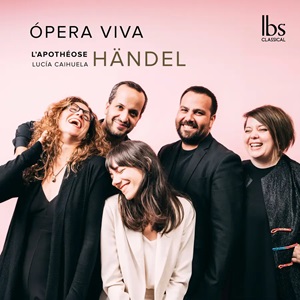
Ópera Viva
Georg Friedrich Händel (1685-1759)
Contents listed after review
Lucía Caihuela (mezzo-soprano)
L’Apothéose/Victor MartÍnez
rec. 2023, Centro de Congresos Fray Luis de León, Guadarrama, Communidad de Madrid, Spain
No texts
IBS Classical IBS222024 [64]
This album presents a medley of instrumental excerpts and arias from a range of Handel’s operas and one oratorio (Hercules, 1745) spanning thirty years of his output. Some of the five vocal items here have been recorded before by an array of famous mezzo-sopranos and countertenors and I am somewhat bemused by the decision taken here to record instrumental arrangements of two arias renowned for showcasing a singer’s vocal pyrotechnics, so for me this recording rather sets itself up for invidious comparisons.
L’Apothéose is an ensemble of a dozen players with a concertmaster, playing original instruments, including a theorbo (like a lute) and traverso (Baroque flute). They are full-out “period”, with minimal or no vibrato; Nina Alacañiz’ grainy oboe adds a distinctive spicy note (please excuse the mixed metaphor) to the tuttis and the opening sinfonia starts off proceedings very energetically. The next number, the celebrated “Scherza infida” provides a complete change of mood but I do not like the way it is sung here: Lucía Caihuela elongates and smooths out phrases which should be suffused with a sense of biting pain and betrayal, so there is a lack of dramatic impact, and she has a singer’s habit I abhor of singing a note “straight” without vibrato then suddenly introducing a flap right at its end. She also resorts too often to some ugly swooping. I cannot listen to her without mentally substituting Janet Baker’s or David Daniel’s voice, much to her disadvantage. It is also sung too slowly, which has the further effect of robbing it of yet more angst; it simply becomes soporific. I do like the theorbo’s contribution, however.
Given my dislike of the singer, I suppose I should welcome the substitution of the voice in “Venti, turbini” by the traverso but I just do not see the point of annexing a renowned vocal showpiece such as this, regardless of how skilfully it is played – which it is, very.
The aria from Hercules is a lovely piece and Caihuela sings it in excellent English – but a proper trill is a requirement and it is missing here. Giulio Cesare is one of my – and surely many other people’s -favourites among Handel’s operas but Caihuela’s hooty, unsteady tone, squeezing of long notes and deficient lower register do no service to the aria selected from it.
There is little point in my ploughing through every track here, as I am underwhelmed by the singing, my comments consist of more of the same as I have already offered above and I cannot assert that the pleasant and pleasing playing of the orchestral numbers compensates sufficiently to justify any recommendation.
Ralph Moore
Buying this recording via a link below generates revenue for MWI and helps us keep free access to the site

Contents:
Agrippina, HWV 6: Sinfonia
Ariodante, HWV 33: Scherza infida
Rinaldo, HWV 7: Venti, turbini
Hercules, HWV 60: Cease, ruler of the day, to rise
Imeneo, HWV 41: Overture
Orlando, HWV 31: Ah, Stigie larve!
Rodelinda HWV 19, Overture & Menuet
Radamisto, HWV 12: Ombra cara di mia sposa
Amadigi di Gaula, HWV 11: Ah! spietato!
Giulio Cesare in Egitto, HWV 17: Svegliatevi nel core

















